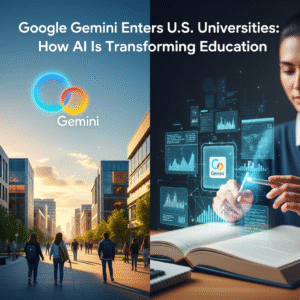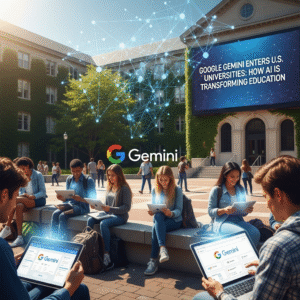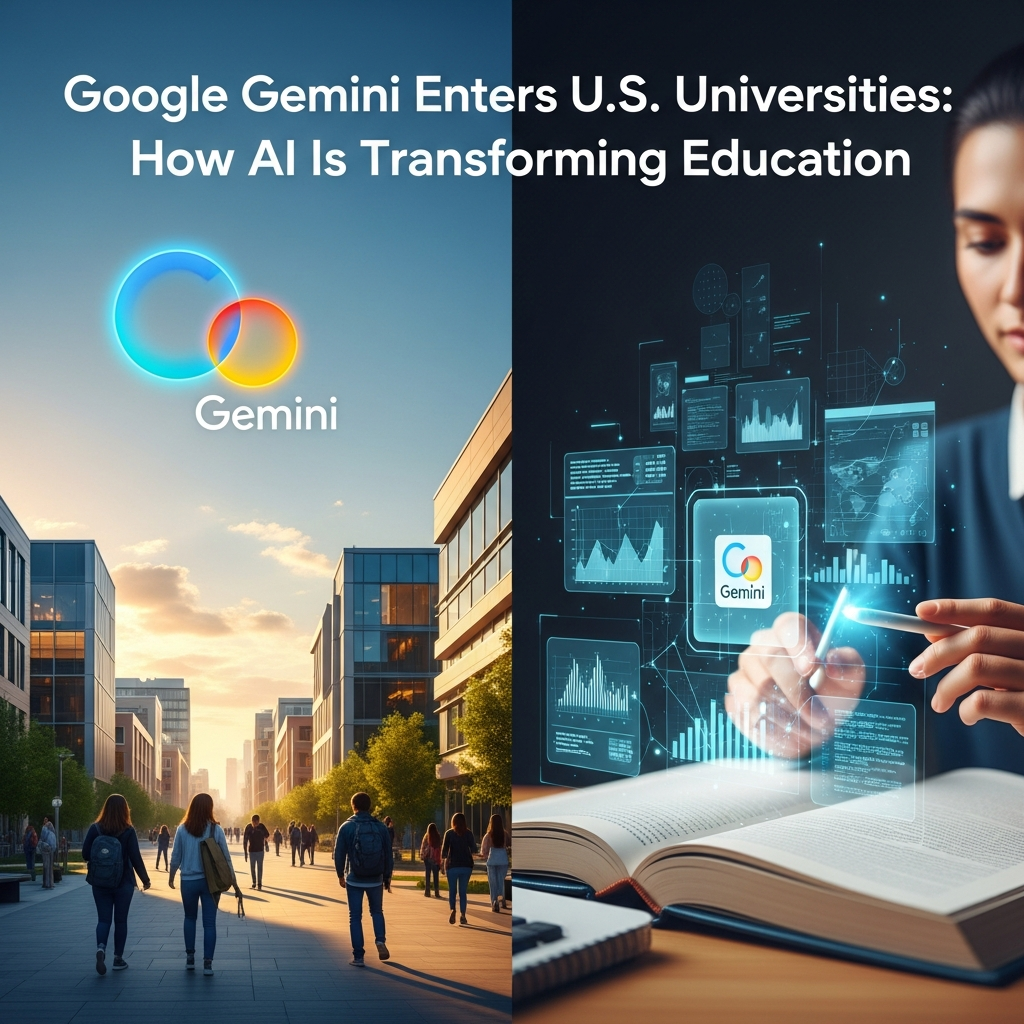What if artificial intelligence could personalize learning for 10 million college students simultaneously while providing them 24/7 academic support at absolutely no cost? This isn’t a futuristic vision—it’s happening right now across American campuses. Google’s Gemini for Education has been integrated into over 1,000 U.S. higher education institutions, reaching more than 10 million students, marking one of the most significant technological transformations in academic history. From Brown University and MIT to California Community Colleges and Texas State University, institutions are fundamentally reimagining how teaching and learning occur in the digital age. This comprehensive integration of AI into higher education represents more than just adopting new technology—it signals a paradigm shift in educational accessibility, personalization, and effectiveness. As universities grapple with rising costs, increasing student diversity, and demands for workforce-ready graduates, Google’s free, enterprise-grade AI solution offers unprecedented opportunities to enhance learning outcomes while addressing critical challenges facing modern education.

The Scale of Google Gemini’s Educational Expansion
Unprecedented Institutional Adoption
More than 1,000 public and private higher education institutions—including Brown University, MIT, California Community Colleges, The Ohio State University, University of Michigan, Notre Dame University, Florida State University, University of California Riverside, Texas State University, and Rice University—are using Gemini for Education. This rapid adoption rate demonstrates both the pressing need for AI solutions in education and universities’ willingness to embrace transformative technology.
The timing of this expansion is crucial. Unlike previous educational technology initiatives that required substantial financial investment, all accredited higher education institutions can access Gemini for Education with data protections, free of charge. This zero-cost model removes the primary barrier that typically prevents widespread educational technology adoption, particularly for community colleges and smaller institutions with limited IT budgets.
Strategic Infrastructure Development
Google’s approach extends beyond simply providing technology. The company launched the Google AI for Education Accelerator, an initiative that offers free AI training and Google Career Certificates to every college student in the U.S. This comprehensive strategy recognizes that technology alone doesn’t transform education—proper training, support, and implementation frameworks are equally essential.
The program includes Google’s recent $1 billion commitment to education in the U.S. over the next three years, supporting AI literacy programs, research funding, and cloud computing resources nationwide. This substantial investment signals Google’s long-term commitment to educational transformation rather than a short-term marketing initiative.

Core Capabilities Transforming Student Learning
Personalized Learning at Scale
Traditional higher education faces a fundamental challenge: how can one professor effectively teach 200-300 students with diverse learning needs, backgrounds, and paces? Professors appreciate that Gemini helps them save time and provides students with in-the-moment assistance, functioning “like having a teaching assistant that the students can go to when the teacher is not available”.
Students are using Guided Learning, which goes beyond quick answers and helps build deep understanding, preparing for exams with personalized practice quizzes, study guides, and flashcards. This capability addresses one of education’s most persistent problems: students often need help precisely when instructors aren’t available—late at night, weekends, or during intense study sessions before exams.
The AI doesn’t simply provide answers; it scaffolds learning. By using learning science principles—like inspiring active learning and stimulating curiosity—as the backbone of how Gemini is built, Google ensures it’s as helpful as possible for learners. This pedagogically-informed design distinguishes educational AI from general-purpose chatbots.
Advanced Academic Tools
Beyond basic tutoring, Gemini offers sophisticated capabilities specifically designed for higher education:
Students can create visual explainers for presentations and group projects using video overviews, use Gemini’s new image generation tool to reimagine spaces and create professional materials, and create math and physics problem sets with improved LaTeX rendering and PDF generation.
For faculty, the system provides equally powerful tools. Educators can quickly draft lesson plans aligned to learning objectives and education standards, get fresh ideas for engaging lessons, re-level texts and assignments to fit student interests, and generate exams, quizzes, assignments and rubrics from scratch. This dramatically reduces administrative burden, allowing professors to focus more time on direct student interaction and mentorship.
Integration with Existing Systems
The ability to assign Gems and Notebooks to students directly in the Canvas by Instructure learning management system with Gemini LTI ensures that AI tools integrate seamlessly into existing workflows rather than requiring disruptive changes to established systems. This interoperability is crucial for institutional adoption—universities can enhance their current infrastructure without complete overhauls.

Real-World Implementation Success Stories
San Diego State University: Campus-Wide AI Integration
SDSU was one of the first California state universities to fully adopt Google technology, implementing campus-wide deployment of Gemini and NotebookLM. Their comprehensive approach demonstrates how institutions can strategically integrate AI across all academic and administrative functions.
The university’s experience highlights a critical insight: successful AI integration requires institutional commitment beyond individual faculty enthusiasm. When AI tools are available campus-wide with proper support systems, adoption accelerates and benefits multiply.
Indiana University: Making AI Fluency Universal
Indiana University has made AI fluency a shared expectation across its entire community, providing every student, faculty, and staff member access to Gemini in a safe, IU-protected environment. Their GenAI 101 course teaches the entire campus how to build and apply Gems—customized AI assistants for specific tasks.
Learners are creating study companions that quiz and coach them, workflow tools that automate complex tasks, and role-play scenarios that prepare them for leadership conversations, transforming how they learn and work. This democratization of AI development empowers students to become creators of AI solutions rather than merely consumers.
The university’s Associate Vice President for Learning Technologies emphasizes the strategic importance: “This isn’t just about experimenting with AI. It’s about preparing tens of thousands of Hoosiers to lead in a world where AI will shape every discipline”.
University of Maryland: Advanced Research Applications
In a graduate finance class at the University of Maryland, students are using Google’s AI suite, including Gemini, NotebookLM, and AI Studio, to reimagine credit risk analysis, processing large amounts of public data from 40 banks and 17 fintechs over two years to build a tool that rates credit risk management effectiveness.
This example illustrates how AI enables students to tackle real-world problems at scales previously impossible in academic settings. Graduate students can now conduct research-quality analysis that would have required professional resources just a few years ago.
University of Hawaii: Comprehensive AI Training
The University of Hawaii offers Google AI Essentials, a free five-hour training that teaches students and faculty how to use AI responsibly. This focus on responsible AI use addresses legitimate concerns about academic integrity, data privacy, and ethical AI deployment.
By providing structured training alongside tool access, universities ensure their communities understand both the capabilities and limitations of AI, fostering informed, ethical use rather than unchecked experimentation.
John Jay College: Predictive Student Success
John Jay College collaborates with Google.org and DataKind on a predictive AI model to identify students most at risk of dropping out. This proactive intervention capability represents AI’s potential beyond direct instruction—supporting institutional effectiveness and student retention.
Early identification of at-risk students allows colleges to provide targeted support when it can make the greatest difference, potentially transforming dropout statistics and improving degree completion rates.
Technical Advantages Driving Educational Impact
Superior Learning Performance
Experts preferred LearnLM over GPT-4o by an average of 31% when evaluated across a diverse set of learning scenarios. This significant performance advantage in educational contexts stems from Google’s deliberate focus on learning science principles rather than general-purpose AI capabilities.
Google is partnering with experts at institutions like Columbia Teachers College, Arizona State University, and NYU Tisch to test and improve this technology, ensuring continuous refinement based on actual classroom experiences and pedagogical expertise.
Enterprise-Grade Security and Privacy
For educational institutions, data protection isn’t optional—it’s legally mandated. Gemini for Education provides data protection free of charge, addressing one of the most significant concerns universities have about adopting third-party AI tools.
Students can use powerful AI capabilities without compromising their privacy or creating institutional liability. This enterprise-grade protection, typically available only through expensive commercial licenses, democratizes access to secure AI for all students regardless of their institution’s resources.
Accessibility and Equity
Gemini is free of charge, making it more accessible to educators and students around the world, helping ensure it benefits as many educators and students as possible. This pricing model fundamentally challenges the traditional educational technology landscape where premium tools remain accessible only to well-funded institutions.
Community colleges serving predominantly low-income students now have access to the same AI capabilities as elite private universities, potentially narrowing rather than widening educational equity gaps.
Upcoming Features Expanding Educational Possibilities
Enhanced Content Creation
Students will soon be able to draft full presentations in seconds with a simple prompt in the Gemini app that can be easily exported to Google Slides. This capability transforms how students approach project-based learning, allowing them to focus more energy on critical thinking and content development rather than formatting and design.
For time-constrained students juggling coursework, employment, and personal responsibilities, these efficiency gains can significantly reduce stress while maintaining or improving work quality.
Advanced Mathematical and Scientific Tools
Improved LaTeX rendering and PDF generation in Gemini Canvas will help create math and physics problem sets and format academic papers. These discipline-specific enhancements demonstrate Google’s commitment to serving diverse academic needs beyond general humanities applications.
STEM education, which has historically been challenging to support with general-purpose AI, benefits from these specialized capabilities that understand mathematical notation, scientific conventions, and discipline-specific formatting requirements.
Clear Educational Context
Clear “EDU” labels will provide crucial context for users on school-issued accounts, reinforcing institutional security and identity. This transparency helps students understand when they’re using educational versus personal AI tools, supporting appropriate use and maintaining academic integrity.
Addressing Concerns and Challenges
Academic Integrity Considerations
The introduction of powerful AI tools raises legitimate questions about academic honesty, originality, and the value of traditional assessments. Rather than banning AI—an increasingly futile approach—forward-thinking institutions are reimagining assignments to leverage AI as a learning tool while still assessing genuine student understanding.
Universities are developing new assessment methods that incorporate AI use transparently, teaching students how to use AI as a professional tool they’ll encounter throughout their careers rather than treating it as an academic shortcut.
Faculty Adaptation and Support
Successful AI integration requires more than providing technology to students—faculty need support understanding how to incorporate AI into their teaching effectively. The free training programs accompanying Gemini deployment address this need, but ongoing professional development remains crucial.
Some faculty members express concern that AI will diminish their role or devalue human instruction. However, early implementations suggest AI enhances rather than replaces faculty impact by handling routine tasks and enabling more personalized student interaction.
Ensuring Equitable Access
While Gemini for Education is free, accessing it requires internet connectivity, devices, and baseline digital literacy—resources not universally available to all students. Universities must address these digital divides to ensure AI tools enhance rather than exacerbate educational inequities.
Institutions are developing computer lab access, device lending programs, and digital literacy training to ensure all students can benefit from AI tools regardless of their personal resources.
The Broader Educational AI Landscape
Competitive Dynamics
Syracuse University has announced that it will offer Claude for Education campuswide, indicating that Google isn’t the only player in the educational AI space. Competition among AI providers will likely accelerate innovation and potentially provide institutions with valuable choice.
However, Google’s combination of no-cost access, enterprise security, seamless integration with widely-used Google Workspace tools, and comprehensive training infrastructure creates a powerful competitive advantage difficult for other providers to match.
Transforming Educational Paradigms
The integration of AI into universities represents more than incremental improvement—it challenges fundamental assumptions about how learning occurs, what students need to know versus what they need to know how to do, and how we measure educational success.
Traditional education emphasized memorization and individual work. AI-augmented education increasingly values critical thinking, creative problem-solving, effective collaboration with AI tools, and the ability to evaluate and refine AI-generated content—skills directly relevant to modern professional environments.
Implementation Best Practices for Institutions
Strategic Planning
Successful AI integration requires institutional vision beyond simply making tools available. Universities should develop comprehensive AI strategies addressing pedagogy, assessment, faculty development, student support, and ethical guidelines.
Clear policies about appropriate AI use in different contexts—from open collaboration to independent work—help students understand expectations and make informed decisions about when and how to use AI tools.
Professional Development
Administrators can use analytics to see how many people are using Gemini and how much they’re using it, identifying power users as well as those who might need more guidance. This data-driven approach enables targeted support and helps institutions understand adoption patterns.
Regular workshops, faculty learning communities, and peer mentoring programs help educators learn from colleagues who have successfully integrated AI into their teaching.
Student Education
Students need explicit instruction about AI capabilities, limitations, and appropriate use. Many students either underutilize AI tools due to unfamiliarity or overrely on them without developing critical evaluation skills.
Orientation programs, first-year seminars, and discipline-specific instruction about AI use in various fields help students develop AI literacy alongside their subject matter knowledge.
Future Implications for Higher Education
Redefining Learning Outcomes
As AI handles routine information retrieval and basic analysis, higher education must refocus on uniquely human capabilities: creative synthesis, ethical reasoning, interpersonal communication, and complex problem-solving in ambiguous situations.
Curricula are evolving to emphasize these higher-order skills while teaching students to effectively collaborate with AI tools as professional partners rather than viewing AI as either threat or replacement for human thinking.
Scaling Personalization
The traditional lecture model, where one professor delivers identical content to hundreds of students, has persisted largely because personalized instruction was impossibly expensive at scale. AI makes true personalization economically feasible, potentially transforming the fundamental instructional model.
Students can receive customized explanations matching their learning style, pace, and prior knowledge while professors focus on mentorship, facilitating discussions, and supporting students through challenging conceptual breakthroughs that still require human guidance.
Preparing for AI-Integrated Careers
Indiana University’s vision is clear: “preparing tens of thousands of Hoosiers to lead in a world where AI will shape every discipline”. This workforce preparation aspect may ultimately prove more important than AI’s role in current learning.
Graduates entering virtually any field will use AI tools professionally. Universities that integrate AI throughout the curriculum prepare students not just with subject knowledge but with the AI fluency demanded by modern employers.
Conclusion
Google Gemini’s integration into over 1,000 U.S. universities represents a watershed moment in higher education, demonstrating that powerful AI tools can be democratically accessible while maintaining enterprise-grade security and pedagogical effectiveness. With 10 million students already benefiting from personalized learning support, enhanced research capabilities, and preparation for AI-augmented careers, this initiative is fundamentally transforming what’s possible in higher education. The combination of no-cost access, comprehensive training, and deep integration with existing systems positions Gemini for Education as foundational infrastructure for 21st-century learning rather than merely another edtech tool.
Is your institution ready to join the AI education revolution? Whether you’re a university administrator, faculty member, or student, explore how Gemini for Education can transform teaching and learning on your campus. Share your experiences with AI in education in the comments below, and subscribe to our blog for ongoing coverage of educational technology innovations, implementation strategies, and emerging trends shaping the future of higher education. The AI transformation of education is happening now—be part of the conversation.
FAQs
Q: Is Google Gemini for Education really completely free for universities?
A: Yes, all accredited higher education institutions can access Gemini for Education with data protections, free of charge. This includes the core Gemini app, NotebookLM, and enterprise-grade security. There is a premium tier called Google AI Pro for Education with additional features that requires payment, but the base educational version provides substantial capabilities at no cost.
Q: How does Gemini for Education differ from the regular consumer Gemini app?
A: Gemini for Education is powered by Gemini 2.5 Pro with significantly higher limits than what consumers get at no cost, plus enterprise-grade data protection and an admin-managed experience. It’s specifically designed with learning science principles and includes educational features not available in the consumer version, such as guided learning tools and direct LMS integration.
Q: What data protections does Gemini for Education provide?
A: Gemini for Education includes enterprise-grade data protection meaning student data isn’t used to train AI models, conversations remain private, and the system complies with educational privacy regulations like FERPA. Schools can configure access through school-issued Google accounts to enable these data-protected AI tools, giving institutions control over how students access the system.
Q: How does Gemini for Education address concerns about academic integrity and cheating?
A: Rather than preventing AI use, Gemini for Education helps institutions integrate AI transparently into learning. Universities like the University of Hawaii offer Google AI Essentials training that teaches students and faculty how to use AI responsibly. The system includes features like Guided Learning that promote understanding rather than just providing answers, and institutions can develop clear policies about appropriate AI use in different contexts.
Q: Can faculty control how students use Gemini in their courses?
A: Yes, faculty can assign Gems and Notebooks to students directly in the Canvas learning management system with Gemini LTI, giving them control over specific AI tools and resources available for particular assignments or courses. Administrators have oversight capabilities and can establish institution-wide policies about AI use.
Q: What happens if my university already uses a different productivity suite like Microsoft 365?
A: Schools can get started with Gemini for Education and NotebookLM at no cost, no matter what productivity suite they use. While integration is deepest with Google Workspace, institutions using other platforms can still provide students with access to Gemini for Education’s core capabilities.
Q: How is Gemini for Education different from ChatGPT or other AI chatbots?
A: Experts preferred LearnLM (the learning model powering Gemini) over GPT-4o by an average of 31% when evaluated across diverse learning scenarios. Gemini for Education is built specifically for education using learning science principles, includes features designed for academic work like LaTeX rendering and LMS integration, and provides the enterprise security and privacy protections required by educational institutions.
Q: What training and support do universities receive when implementing Gemini for Education?
A: Google launched the Google AI for Education Accelerator, an initiative offering free AI training and Google Career Certificates to every college student in the U.S. This includes structured training programs, resources for faculty professional development, and ongoing support. Administrators can track usage analytics to identify users who might need additional guidance, enabling targeted support.
Q: Can Gemini for Education help with advanced research and graduate-level work?
A: Absolutely. University of Maryland graduate students are using Gemini, NotebookLM, and AI Studio to conduct sophisticated credit risk analysis, processing data from 40 banks and 17 fintechs. The system supports advanced academic work including mathematical problem-solving, research synthesis, data analysis, and academic writing—capabilities valuable for graduate students and faculty research.
Q: How quickly can a university implement Gemini for Education?
A: Administrators can use the online sign-up to register their domain and configure school-issued Google accounts to enable access to these no-cost, data-protected AI tools. The technical implementation can be accomplished relatively quickly, though successful integration requires strategic planning for training, policy development, and change management to ensure effective adoption across the institution.

